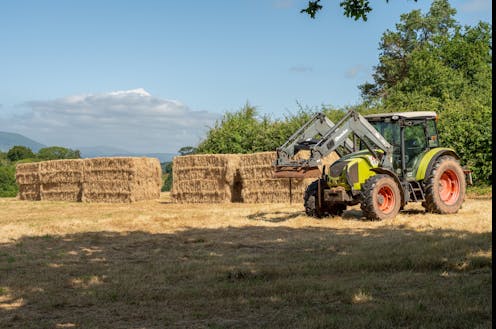
The UK is required to reach net zero emissions by 2050 under the Climate Change Act, with five-yearly carbon budgets in place to track progress towards this goal. But earlier this year, the Climate Change Committee, which advises the UK and devolved governments, warned that only a third of the required emissions reductions would be met by 2030 at the current pace.
Wales, with its mix of devolved powers, is exploring how to reach net zero by 2035. The Wales Net Zero 2035 Challenge Group was set up in 2023 to explore how it might achieve this. Members, including me, were appointed from industry, non-governmental organisations and academia, with expertise spanning climate change, buildings, energy, transport, finance, education and agriculture.
The final report includes a host of recommendations on how Wales should look to cut carbon emissions across all sectors. Here are five that relate to food and farming.
1. Tackle agricultural emissions head on
Farmers often argue they are being unfairly targeted with net zero policies. But agriculture is projected to become Wales’ largest source of emissions by 2035.
It’s not that agricultural emissions are increasing, it’s just that other sectors are either already doing better at reducing emissions, or have plans in place that will reduce emissions in the next few years. Changes in farming practices are going to be essential.
By far the largest source of emissions in Welsh agriculture is livestock. Methane from cattle and sheep is responsible for 61% of Welsh agricultural emissions with another 14% coming from manure management.
Improvements in animal health and breeding, and innovations to reduce methane production will help reduce emissions, but only by around 20% to 25%. This means that reducing the number of cattle and sheep is unavoidable. This is a difficult conversation, especially given that most Welsh-produced red meat is exported to other parts of the UK and beyond.
2. Develop a comprehensive land-use framework
With just 20% of Welsh land classified as suitable for high-yield horticulture and arable agriculture compared with 42% in England, land use in Wales needs to be carefully managed. A more organised approach would help prioritise prime agricultural land while balancing other land needs, from biodiversity and flood management to housing and renewable energy projects.
This would draw heavily on the agricultural land classification scheme. Developed in the 1960s by the UK government and updated regularly ever since, the scheme grades land from the highest quality to the lowest quality. Grades are based on things like soil type, climate, slope, aspect and likelihood of flooding.
Encouraging Welsh farmers to diversify into horticulture and arable farming, where possible, could boost local food production and reduce reliance on imported goods.
3. Introduce a clear plan for farmers
Farmers in Wales need clarity on how they can adapt to net zero targets. A sustainable farming scheme is set to launch in Wales in 2026, offering farmers financial incentives to support environmental, social and animal welfare goals.
But while the scheme shows promise, it is unlikely to reduce agricultural emissions by very much. To meet ambitious net zero targets, the Welsh government must outline clear measures and the expected emissions reductions each would result in. This would give farmers a roadmap for climate-friendly practices.

4. Fund nature restoration through innovative mechanisms
Land management often involves providing public services to improve issues such as biodiversity, flood protection and carbon sequestration. But these are things that don’t generate direct income for farmers.
In England, a natural environment investment readiness fund supports interested groups to develop nature restoration projects that are then paid for by private investment. A similar scheme also exists in Scotland. But Wales and Northern Ireland are yet to follow suit. Wales could adopt the types of funding models already used in England and Scotland.
For example, peatland restoration – crucial for reducing emissions and managing flood risks – could benefit from these types of schemes. Investing in such initiatives would align environmental priorities with economic incentives for farmers.
5. Maximise the broader benefits of net zero
Reaching net zero isn’t just about cutting emissions, or at least it shouldn’t be. Net zero is an opportunity to improve quality of life. A more diverse food production system in Wales could create jobs, improve public health through healthier diets and reduce NHS costs.
Towns and cities could be at lower risk of flooding if land were managed to minimise run off, and air and water quality could be improved. Increased biodiversity would also add to Wales’s natural beauty. These types of benefits highlight how climate action can deliver far-reaching gains, both environmentally and socially.
Read more: How farmers can install solar panels in fields without damaging the rest of their operation
Wales may face unique challenges on its path to net zero, but the report’s recommendations offer valuable insights for other nations too. From addressing agricultural emissions to developing innovative funding models, climate action can balance environmental, economic and social priorities.
Judith Thornton works on proejcts funded by UKRI and DESNZ.
This article was originally published on The Conversation. Read the original article.







